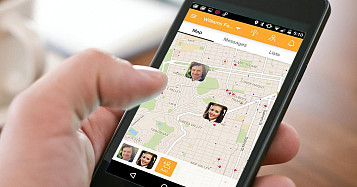On a busy weekend, my husband, Brandon, took our three children to the park so I could work. When he didn’t respond to my text asking him to hit the grocery store on the way home and I couldn’t track him on Find My Friends, I called. With the music blaring and all four of my boys singing loudly off-key, my every-two-minute phone calls went unnoticed. All eight of them.
In my mind, I conjured images of a horrible car accident—my entire family gone in an instant. After 15 minutes, I became so unhinged that I left the house and started driving the route they would take to get home while asking Siri to dial again. As I turned the corner onto the main street, I spotted our van. Then, a few seconds later, I saw Brandon’s head bobbing to the music as I passed him going the other direction.
I had to ask myself: Was having the ability to immediately reach a loved one—or at least pinpoint their location—stressing me out? Nancy Colier, a New York-based licensed clinical social worker, reverend, and author of The Power of Off: The Mindful Way to Stay Sane in a Virtual World, tells me my neurosis of needing to reach people instantly isn’t an anomaly in the digital age. In fact, Colier says, with all of the texting, monitoring, and tracking, most of us are living in a constant state of anxiety.
“It used to be that we would go for long periods without knowing where someone was, ” Colier says. “Now, there has been a paradigm shift from 'the world is a safe place we can trust’ to 'if we don’t micromanage and control every moment, something terrible will happen.'”
Yet there’s plenty of evidence to suggest our loved ones, friends, and even our children are safer in the world today than they were in the 1990s—in terms of violent crime, child abductions, and motor vehicle accidents. Plus, in the unlikely event of an actual emergency, authorities can use cell phone tower data to locate our broods. So do we really need tracking technology?
Manage Your Tracking Impulses
For most people, monitoring family members’ movements typically begins as a virtuous pursuit. Parents, spouses, and anyone concerned about an elderly relative can use apps like Life 360, mSpy, and FamiSafe to make sure their loved ones are safe—and that they can reach them in an emergency. (Although we strongly advise against using such apps, for a variety of reasons.)
In recent years, I’ve relied on Find My Friends as a sort of crystal ball that reassures me everything is as it should be. I use it to make sure my mom, siblings, and husband have made it from point A to point B, and in Brandon’s case to find out if he’s left the office. A bonus: Letting family members track me has lifted the burden of needing to check in when I get where I’m going.
But in an era when parents can monitor their kids’ every move, teens follow their crush’s digital footprint, and spouses like me freak out when their families go dark for 15 minutes, a growing number of experts are questioning whether it’s healthy to be this connected to our loved ones.
